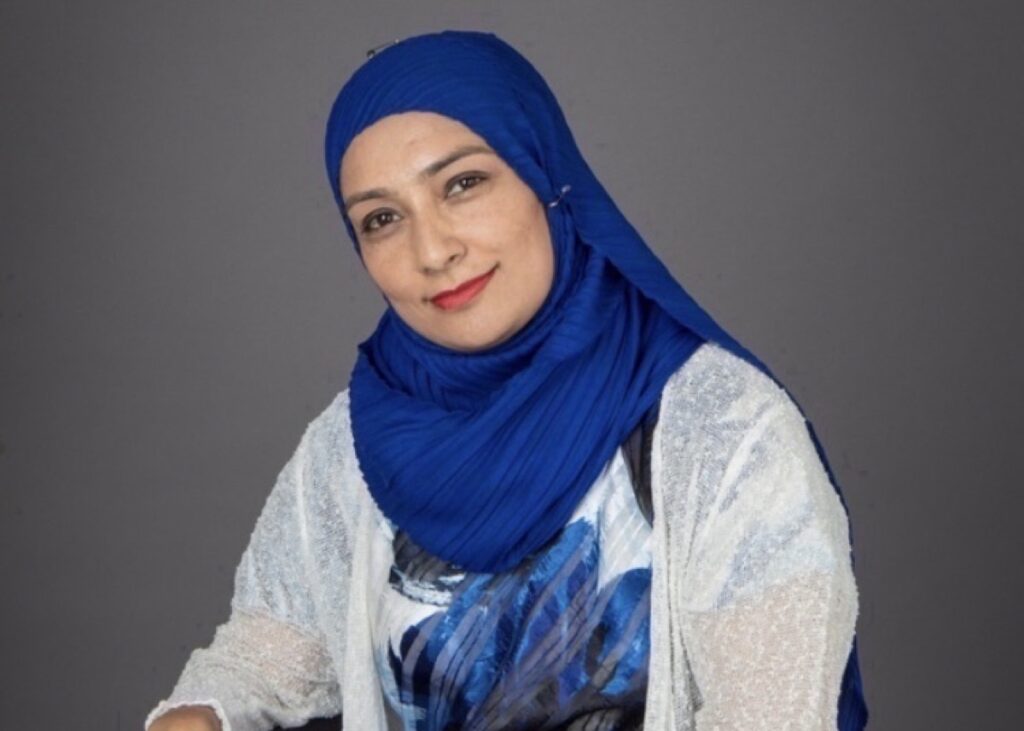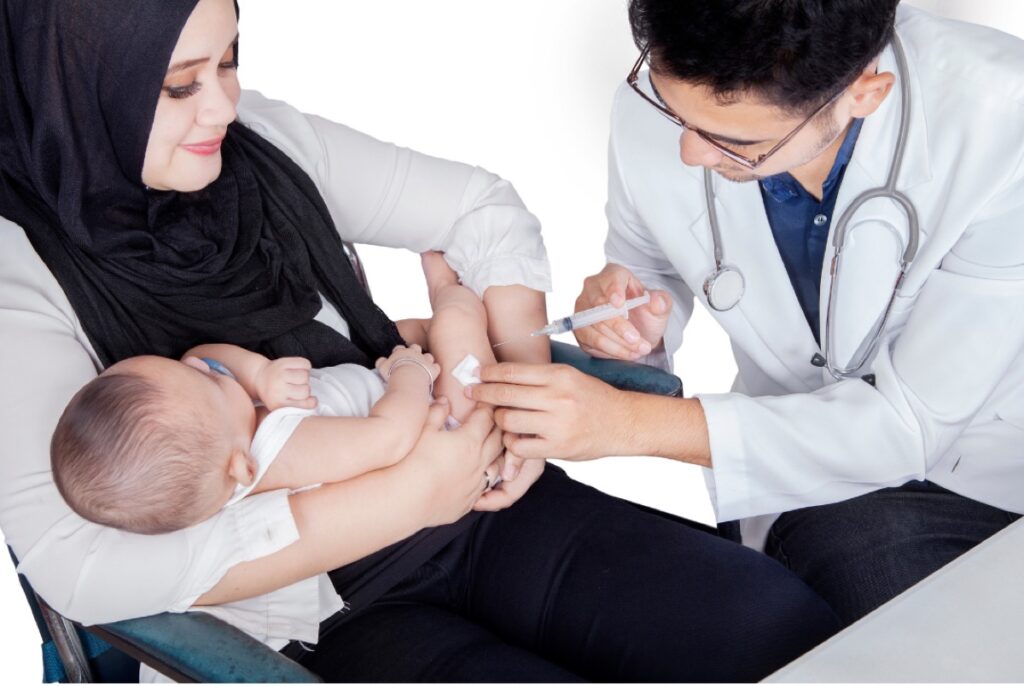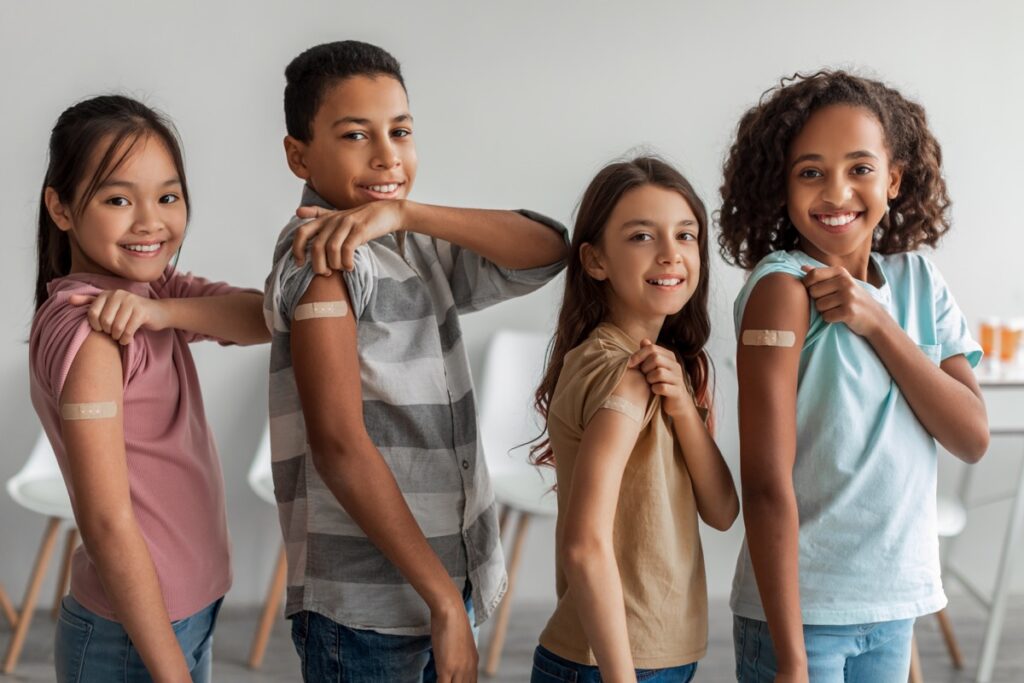
With National Children’s Day being marked in Bangladesh, it’s a good time to check in on the health of our children here in Britain. Dr Hussain, a GP in London, answers questions about vaccinations to help keep your child protected.
Produced in Association with the NHS

How do we know NHS vaccines are the safest way to protect children?
The vaccinations offered by the NHS, including those given in school, are thoroughly tested and millions of people across the country receive them – including those from our own communities.
Authorised by the Medicines and Healthcare Regulatory Agency (MHRA) they are continuously monitored for rare side effects, as well as more common symptoms like a sore arm.
Dr Farzana Hussain says: “As a parent myself, the evidence around the vaccinations offered to our children is reassuring. It shows they don’t cause allergies or other conditions. There is a lot of misinformation about vaccines and if you’re concerned, please talk to your GP practice, school nurse or a pharmacist. We are here to help.”
Should I vaccinate my child?
It’s your decision. If an unvaccinated child comes into close contact with someone who has a highly contagious infection like measles, it’s likely they’ll catch it too. Measles can have serious complications including pneumonia, meningitis and in rare cases death. It can also weaken a child’s immune system for a few years after infection. Vaccination is the safest way to protect against serious infectious diseases. The MMR vaccine provides protection from measles, mumps and rubella and also helps to stop their spread, protecting others who can’t have the vaccination.
How do vaccines work?
Vaccines help to train your immune system to react effectively when you come into contact with a specific infection. Making antibodies and special cells to get rid of the bugs, bacteria and viruses causing that disease, helping to protect you from getting seriously ill.
Can I check if my child has missed a vaccination?
Yes, your child’s digital health record or their red book will show if they are up to date with their vaccinations. You can also speak to your GP practice who have a record of which vaccinations your child has had.
What can I do if my child has missed their vaccination?
By the time our children leave school, they will have typically been offered vaccinations against 18 different serious diseases or infections. If your child has missed a vaccine, including those given at school, talk to your GP practice to find out how your child can receive this. If your child is home-schooled, or not in mainstream education, and has not had all their vaccinations, contact your local authority education department. It is never too late for children to catch up on their childhood vaccinations.
Are vaccines halal or vegetarian?
Vaccinations contain different ingredients. A very small number of vaccinations contain animal products, such as gelatine, whilst some might contain products such as egg. The vaccine consent letter might tell you whether the vaccine being offered contains animal products and what is in it. You can also ask the person providing the vaccination whether it contains animal products and whether there is a suitable alternative, like the flu vaccine. You can also seek guidance from your religious leader.
Does my child need the BCG vaccine?
BCG vaccine (Bacillus Calmette-Guérin) protects against tuberculosis (TB). It is not routinely given to all children, but a small number of babies and children with an increased risk of TB may be invited for the vaccine. Babies who are in close contact with someone who has infectious TB, or live in UK areas with high TB rates, or if their parents or grandparents were born in a country with high TB rates are recommended to have the vaccine before they are 28 days old. It can also be given to older children whose parents or grandparents were born in a country with high TB rates, if they recently arrived from one of these countries, have lived with local people for 3 months or longer in countries with high TB rates or are in close contact with someone who has infectious TB.
Can my child have a COVID-19 jab?
All children aged 5 or older on 31 August 2022 can get 2 doses of the COVID-19 vaccine until 30 June 2023. Others can get the COVID-19 vaccine only if they are at higher risk due to a health condition or weakened immune system, or they live with someone who has a weakened immune system. Those with a severely weakened immune system can also get an additional, third dose.
Can my child be vaccinated against Strep A and scarlet fever?
You may have been worried about your child getting scarlet fever and group A streptococcus infections over the last few months. Whilst there isn’t a vaccine and it can’t be prevented, Strep A infection can be treated with antibiotics. Please contact your GP practice or call 111 for free if your child has symptoms of scarlet fever or ‘strep throat’ such as fever, sore throat, swollen glands, difficulty swallowing and headache. Scarlet fever also causes a sandpapery rash on the body and a swollen tongue.
Can adults catch-up on missed vaccinations?
If you have missed a vaccination offered to you as a child or an adult, speak to your GP practice about whether you might need it. This includes for example the Pneumococcal (PPV) vaccine (pneumonia vaccine) given to people at the age of 65 or the shingles vaccine for people in their 70s. Find out more at www.nhs.uk/vaccinations
Children’s vaccination guide
For babies aged under 1 year

At 8, 12 and 16 weeks 6-in-1-vaccine protects against diphtheria, hepatitis B, Hib, polio, tetanus, whooping cough.
At 8 and 12 weeks Rotavirus vaccine protects against a highly infectious stomach bug.
At 8 and 16 weeks MenB vaccine protects against infection by meningococcal group B bacteria.
12 weeks Pneumococcal (PCV) vaccine protects against infections which can lead to pneumonia, meningitis and sepsis.
For children aged 1-15 years

1 year old boosts protection for the 6-in-1 vaccine and protects against
Hib/Men C vaccine boosts protection for the 6-in-1 vaccine and protects against Meningitis C
MenB vaccine boosts protection for the MenB vaccine given to babies
Pneumococcal (PCV) vaccine boosts protection for the PCV vaccine
MMR vaccine protects against measles, mumps and rubella.
3 years and 4 months
4-in-1 pre-school booster vaccine boosts protection for the 6-in-1 vaccine.MMR vaccine boosts protection for the MMR vaccine given to babies.
12-13 years, and currently with a second dose 6-24 months later
HPV vaccine protects against cancers caused by human papillomavirus.
14 years
3-in-1 teenage booster boosts protection for the 6-in-1 and the 4-in-1 pre-school booster vaccine
MenACWY protects against 4 strains of the meningococcal bacteria – A, C, W and Y – which can cause meningitis and blood poisoning (septicaemia)
To book your first or second COVID-19 vaccinations, while they are still available, visit nhs.uk/COVIDvaccine, scan the QR code, or call 119 for free.













